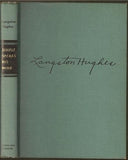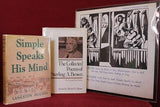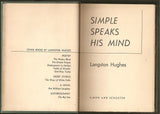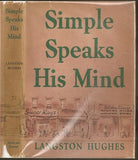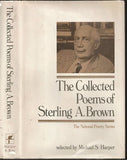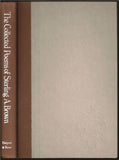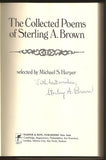Simple Speaks His Mind and The Collected Poems of Sterling A Brown
Author: Hughes, James Mercer Langston (1902-1967) and Sterling Allen Brown inscribed
Year: [1950] and 1980
Publisher: Simon and Schuster and Harper & Row Publishers
Place: New York
Description:
Simple: 231+[1 biography] pages. Octavo (8: x 6") bound in original publisher's green cloth with black lettering to spine and facsimile signature to cover with black label in gilt lettering to spine; deckle edges with green head end pages in original pictorial jacket. Collected Poems: xii+255 pages with bibliography. Royal octavo (9 1/2" x 6 1/4") bound in original publisher's quarter brown cloth with silver lettering to spine over beige boards with blind stamped insignia to cover in original pictorial jacket. Selected by Michael S Harper. Inscribed by the author. First edition. This is sold with the vinyl pressing of Folkways Records with Langston Hughes reads from his book Simple Speaks his Mind and Sterling Brown reads from his Break of Day etal. First edition.
Langston Hughes's stories about Jesse B. Semple--first composed for a weekly column in the Chicago Defender and then collected in Simple Speaks His Mind, Simple Takes a Wife, and Simple Stakes a Claim--have been read and loved by hundreds of thousands of readers. Simple might be considered an Everyman for black Americans. Hughes himself wrote: "...these tales are about a great many people--although they are stories about no specific persons as such. But it is impossible to live in Harlem and not know at least a hundred Simples, fifty Joyce's, twenty-five Zaritas, and several Cousin Minnies--or reasonable facsimiles thereof."
Sterling Allen Brown (1901-1989) was a black professor, folklorist, poet and literary critic. He chiefly studied black culture of the Southern United States and was a full professor at Howard University for most of his career. He was a visiting professor at several other notable institutions, including Vassar College, New York University (NYU), Atlanta University, and Yale University. In 1932 Brown published his first book of poetry Southern Road. It was a collection of poems with rural themes and treated the simple lives of poor, black, country folk with extra poignancy and dignity. It also used authentic dialect and structures. Despite the success of this book, he struggled to find a publisher for the followup, No Hiding Place. Sterling Brown was most known for his authentic southern black dialect. His poetic work was influenced in content, form and cadence by African-American music, including work songs, blues and jazz. Like that of Jean Toomer, Zora Neale Hurston, Langston Hughes and other black writers of the period, his work often dealt with race and class in the United States. He was deeply interested in a folk-based culture, which he considered most authentic. Brown is considered part of the Harlem Renaissance artistic tradition, although he spent the majority of his life in the Brookland neighborhood of Northeast Washington, D.C.
Condition:
Simple with slight stain at head end pages, point light rubbed. Jacket with light edge wear and small closed tears, spine ends chipped with a 1/2" x 1/4" at back heal edge, spine age darkened else a better than very good copy in a very good unrestored jacket. collected Poems Inscribed by the author on title. Jacket lightly soiled, price clipped else a near fine copy in like jacket. Vinyl jacket lightly soiled else very good.
Year: [1950] and 1980
Publisher: Simon and Schuster and Harper & Row Publishers
Place: New York
Description:
Simple: 231+[1 biography] pages. Octavo (8: x 6") bound in original publisher's green cloth with black lettering to spine and facsimile signature to cover with black label in gilt lettering to spine; deckle edges with green head end pages in original pictorial jacket. Collected Poems: xii+255 pages with bibliography. Royal octavo (9 1/2" x 6 1/4") bound in original publisher's quarter brown cloth with silver lettering to spine over beige boards with blind stamped insignia to cover in original pictorial jacket. Selected by Michael S Harper. Inscribed by the author. First edition. This is sold with the vinyl pressing of Folkways Records with Langston Hughes reads from his book Simple Speaks his Mind and Sterling Brown reads from his Break of Day etal. First edition.
Langston Hughes's stories about Jesse B. Semple--first composed for a weekly column in the Chicago Defender and then collected in Simple Speaks His Mind, Simple Takes a Wife, and Simple Stakes a Claim--have been read and loved by hundreds of thousands of readers. Simple might be considered an Everyman for black Americans. Hughes himself wrote: "...these tales are about a great many people--although they are stories about no specific persons as such. But it is impossible to live in Harlem and not know at least a hundred Simples, fifty Joyce's, twenty-five Zaritas, and several Cousin Minnies--or reasonable facsimiles thereof."
Sterling Allen Brown (1901-1989) was a black professor, folklorist, poet and literary critic. He chiefly studied black culture of the Southern United States and was a full professor at Howard University for most of his career. He was a visiting professor at several other notable institutions, including Vassar College, New York University (NYU), Atlanta University, and Yale University. In 1932 Brown published his first book of poetry Southern Road. It was a collection of poems with rural themes and treated the simple lives of poor, black, country folk with extra poignancy and dignity. It also used authentic dialect and structures. Despite the success of this book, he struggled to find a publisher for the followup, No Hiding Place. Sterling Brown was most known for his authentic southern black dialect. His poetic work was influenced in content, form and cadence by African-American music, including work songs, blues and jazz. Like that of Jean Toomer, Zora Neale Hurston, Langston Hughes and other black writers of the period, his work often dealt with race and class in the United States. He was deeply interested in a folk-based culture, which he considered most authentic. Brown is considered part of the Harlem Renaissance artistic tradition, although he spent the majority of his life in the Brookland neighborhood of Northeast Washington, D.C.
Condition:
Simple with slight stain at head end pages, point light rubbed. Jacket with light edge wear and small closed tears, spine ends chipped with a 1/2" x 1/4" at back heal edge, spine age darkened else a better than very good copy in a very good unrestored jacket. collected Poems Inscribed by the author on title. Jacket lightly soiled, price clipped else a near fine copy in like jacket. Vinyl jacket lightly soiled else very good.








